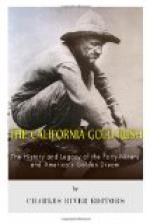CHAPTER X
ORDEAL BY FIRE
San Francisco in the early years must be considered, aside from the interest of its picturesqueness and aside from its astonishing growth, as a crucible of character. Men had thrown off all moral responsibility. Gambling, for example, was a respectable amusement. People in every class of life frequented the gambling saloons openly and without thought of apology. Men were leading a hard and vigorous life; the reactions were quick; and diversions were eagerly seized. Decent women were absolutely lacking, and the women of the streets had as usual followed the army of invasion. It was not considered at all out of the ordinary to frequent their company in public, and men walked with them by day to the scandal of nobody. There was neither law nor restraint. Most men were drunk with sudden wealth. The battle was, as ever, to the strong.
There was every inducement to indulge the personal side of life. As a consequence, many formed habits they could not break, spent all of their money on women and drink and gambling, ruined themselves in pocket-book and in health, returned home broken, remained sodden and hopeless tramps, or joined the criminal class. Thousands died of cholera or pneumonia; hundreds committed suicide; but those who came through formed the basis of a race remarkable today for its strength, resourcefulness, and optimism. Characters solid at bottom soon come to the inevitable reaction. They were the forefathers of a race of people which is certainly different from the inhabitants of any other portion of the country.
The first public test came with the earliest of the big fires that, within the short space of eighteen months, six times burned San Francisco to the ground. This fire occurred on December 4, 1849. It was customary in the saloons to give negroes a free drink and tell them not to come again. One did come again to Dennison’s; he was flogged, and knocked over a lamp. Thus there started a conflagration that consumed over a million dollars’ worth of property. The valuable part of the property, it must be confessed, was in the form of goods, is the light canvas and wooden shacks were of little worth. Possibly the fire consumed enough germs and germ-breeding dirt to pay partially for itself. Before the ashes had cooled, the enterprising real estate owners were back reerecting the destroyed structures.




